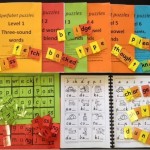Free spelling book
2 Replies
I’ve been trying to think of ways to help teachers organise their thinking about sounds and letters, and make teaching children about sounds and spellings seem interesting, finite and do-able.
Years ago I went through the whole dictionary and sorted it by sound (phoneme) and spelling pattern (grapheme), and made a spiral-bound booklet of spelling lists for myself called Spelling Sorted.
This put examples of every spelling pattern at my fingertips.
Showing learners the patterns
It let me confidently demonstrate to learners both the major patterns (like the “ai” in “rain”, “sail” and “maid”), and unusual ones (the “ai” in “said”, and also “again” and “against”, if you have an Australian accent like me).
It let me show learners how some spellings are shared by more than one sound, e.g. the “ou” in “shout”, “soup”, “country”, “soul”, “cough” and even “ouija” (incidentally, a word created by putting the French and German words for “yes” together).
It also helped me explain to learners that English spelling is complex because English is made up of words from many languages. For instance, the “ph” in “phone”, “elephant” and “alphabet” is usually in words that come from Greek, and the “é” in “café”, “paté” and rosé” is usually from French, and words with “ng” like “sing”, “long” and “hang” are usually Germanic-origin words brought into English very early by the Angles, Saxons, Jutes or Vikings.
I printed off a few copies of Spelling Sorted for teachers and integration aides with whom I was working, and years later discovered (to my surprise) that people are still using it. One teacher said he loved his bashed-up old copy of Spelling Sorted, and used it constantly.
So I put the whole thing on this website to make it accessible to everyone, but I find that I still use my paper copy. Sometimes I don’t have internet access, and sometimes it’s just quicker to flick through the book than find my way through the online menus.
Spelling Sorted
Now I’ve made a new version of this booklet, also called Spelling Sorted, which you can download free from this website. Click here to do so.
The index at the front lets you look up any sound and find lists of words containing all its spellings, a bit like this menu.
For example, you can look up the sound “ou” and find words like “out, house, found, loud”, “brown, clown, cow, now”, “bough, drought, plough”, “Auschwitz, sauerkraut, umlaut”, “Lao, Maori, Sao Paulo”, and outliers like “McLeod”, “Howe” and “miaow”.
The index at the back lets you look up spellings and find words containing sounds that use that spelling, a bit like this menu.
For example, you can look up the spelling “ea” and find lists of words like “sea”, “dead”, “great”, “bream” and “Sean” (the latter two lists only containing one word).
The index at the back also includes some information about where many of the words using a spelling pattern come from, for example the “tion” in “lotion” is from Latin, the “ch” in “school” is from Greek and the “que” in “boutique” is from French. I haven’t had a lot of time to research this, so please use this information only as a starting point, and go to any good dictionary, or a dictionary of etymology, to find out more about the origins of specific words.
I hope you like and use Spelling Sorted, and that it helps you organise your thinking about spelling.
If you find any errors in it (it’s hard to edit and proof one’s own work) or have suggestions to improve it, please let me know.
Again, here’s the link to where you can download your own copy of Spelling Sorted.



Is organise spelled or ga nise? I think not I believe the correct spelling is: or ga nize? Thank you. Cordially, Ms. Teri Manfre
manfre3d@gmail.com
It depends on whether you prefer UK or US English. I speak Australian English and we mostly use British English spellings, so we spell organise with an “s”. In US English it is spelt with a “z”. Noah Webster, who wrote the first American English dictionary, was a nationalist and a spelling reformer, so he changed a lot of spellings, which is why in our globalised (or he’d write globalized) world, English speakers now have to deal with both colour (UK) and color (US), centre (UK) and center (US), cosy (UK) and cozy (US), and so on. A whole group of words which in UK English end with “ise” are spelt with “ize” in US English, see the right-hand column of this list: https://www.spelfabet.com.au/spelling-lists/sorted-by-sound/z/s-as-in-his. This nearly did my head in when I had to teach American English in Mexico! My advanced students were always asking me to pronounce words with a UK, US and then Australian English, and asking me about spelling differences. It would have been much better for all of us if Noah Webster hadn’t stuck his oar in and the spellings were all the same!